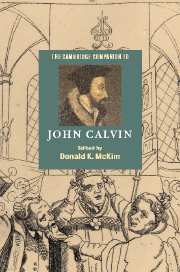Book contents
- Frontmatter
- Part I Calvin’s Life and Context
- Part II Calvin’s Work
- 3 Calvin’s writings
- 4 Calvin as a biblical interpreter
- 5 Calvin’s theology
- 6 Calvin’s ethics
- 7 Calvin’s preaching
- 8 Calvin on piety
- 9 Calvin and social-ethical issues
- 10 Calvin and political issues
- 11 Calvin’s controversies
- Part III After Calvin
- Part IV Calvin Today
- Select bibliography
- Index
6 - Calvin’s ethics
from Part II - Calvin’s Work
Published online by Cambridge University Press: 28 May 2006
- Frontmatter
- Part I Calvin’s Life and Context
- Part II Calvin’s Work
- 3 Calvin’s writings
- 4 Calvin as a biblical interpreter
- 5 Calvin’s theology
- 6 Calvin’s ethics
- 7 Calvin’s preaching
- 8 Calvin on piety
- 9 Calvin and social-ethical issues
- 10 Calvin and political issues
- 11 Calvin’s controversies
- Part III After Calvin
- Part IV Calvin Today
- Select bibliography
- Index
Summary
The foundational theological doctrine for understanding Calvin's view of Christian ethics is creation. In the act of creation God brings into existence, not only all creatures, but also “the very order of things” directing them. This ordering is the means by which God governs all of his creation. Creatures in their diversity obey God by submitting to the “order of nature” that he has determined for them. This is also the case for human beings. Though they are distinct from all other creatures in that they are made in the image of God, their lives are still governed by the order of nature. It prescribes their relations to God, to one another, and to the rest of creation. The entry of sin and evil into the world has not changed that. Calvin appeals to Romans 2:14- 15 to argue that all people, including the Gentiles who have no knowledge of the Mosaic law, are still subject to the divinely established order of nature as the ethical law for human life.
The fall of humanity described in Genesis 3 has radically affected human ethical life. Calvin’s view is that the whole of human nature and its faculties are corrupted by the effects of sin. He makes a sharp break with classical philosophers and medieval scholastic theologians who view reason as a sufficient guide for human conduct, both in its ability to discern good and evil, and in its power to direct the human will and affections into virtuous action.
- Type
- Chapter
- Information
- The Cambridge Companion to John Calvin , pp. 93 - 105Publisher: Cambridge University PressPrint publication year: 2004
- 5
- Cited by

